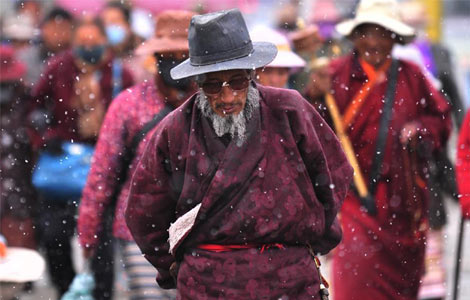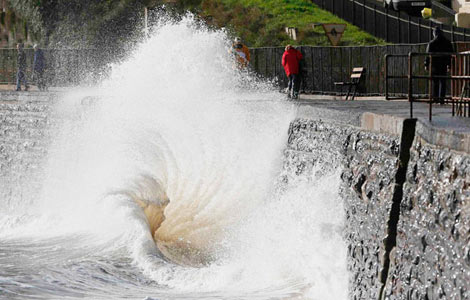The road once taken
Updated: 2013-10-29 08:12
By Cui Jia (China Daily)
|
||||||||
Treasured possession
Heymdrog, one of the drivers, said Mongolians treat the grassland as a treasured possession so most of it has been left untouched, even though there are large deposits of coal underground. Mongolia is the most sparsely populated country in the world and more than 45 percent of its population of 2.9 million lives in the capital Ulan Bator.
The green and yellow grassland stretched as far the eye could see and a special fragrance hung in the air. "This little-changed landscape might be exactly what my ancestors would have seen," said He, who became emotional while looking out the window.
After driving in the direction of Ulan Bator for five hours, the weather changed dramatically. First, rain began to pour, quickly followed by hailstones. The horses belonging to the local herdsmen grouped together and turn their heads away from the driving rain to protect their eyes. The experienced SUV drivers followed the horses' example; unlike their ancestors, the modern-day travelers didn't need to hide under their vehicles for shelter during the storm.
When the rain had stopped, a layer of fine mist rose from the grass and quickly disappeared. The fleet of SUVs continued heading westward and, after cresting a small hill, He suddenly asked his driver to stop because he'd spotted something in the sky ahead of them.
"Don't the clouds look like a fleet of oxcarts with people on them?" he asked the others, who all agreed. "Maybe it's a sign that they (the ancestors) are with us now," muttered He, as if to himself.
As the sky grew dark, illuminated occasionally by bolts of lightning, the group decided to halt for the day and camp in the wilderness. It was the first time that many of them had erected a tent, but with the help of modern technology and materials, the difficulties they faced were as nothing compared with those faced by their ancestors, they said.
The next day, just before sunset, the group arrived at the Kherlen River, the SUVs covered in mud from top to bottom.
Although it was just 50 km to Ulan Bator and the sealed road had reappeared, the group decided to camp on the banks of the river, which occupies a special place in Xibe folklore because of its significance to the original travelers.
The Xibe soldiers and their relatives made their way across Mongolia by following rivers and visiting coaching inns run by the Qing government to acquire water and other supplies. The inns, which were designed as conduits for military information and mail, big and small, all had one feature in common - a well. These abandoned water sources can still be seen on the grassland, marking the sites of former official supply points.
A bonfire was lit and the modern-day travelers gathered around it, holding up their wet sleeping bags and clothing to dry, just as their ancestors did.
 ABC apologizes for 'Kimmel' joke
ABC apologizes for 'Kimmel' joke
 Snowfall hits many areas of Tibet
Snowfall hits many areas of Tibet  Lang Lang named UN Messenger of Peace
Lang Lang named UN Messenger of Peace Antiquated ideas source of Abe strategy
Antiquated ideas source of Abe strategy
 Storm wrecks havoc in S Britain, leaving 4 dead
Storm wrecks havoc in S Britain, leaving 4 dead
 Women's congress aims to close income gap, lift status
Women's congress aims to close income gap, lift status
 Sao Paulo Fashion Week held in Brazil
Sao Paulo Fashion Week held in Brazil
 Serena beats Li Na for WTA title
Serena beats Li Na for WTA title
Most Viewed
Editor's Picks

|

|

|

|

|

|
Today's Top News
Albright counsels fact not myth in US-China relations
Is Obama's lack of transparency really his fault?
San Diego Symphony debuts at Carnegie
Lang Lang takes on UN `Messenger of Peace’ role
At 72, China’s ‘Liberace’ still wows fans
Penn State: 26 people get $59.7m over Sandusky
China providing space training
Miscommunication causes conflicts
US Weekly

|

|







